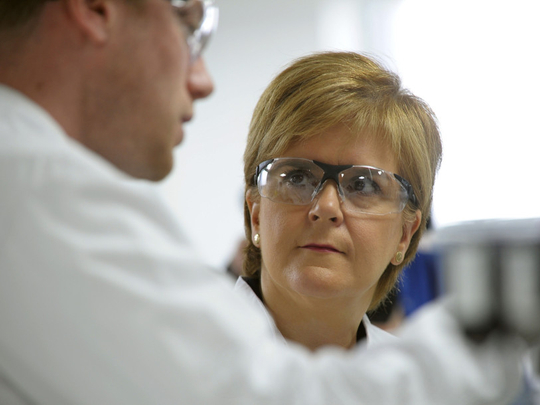
The pursuit of a momentous quest is useful when it comes to maintaining political unity. After the war, for example, Communist intellectuals refrained from criticising the Soviet Union because they believed its very ambition justified and excused its shortcomings; drawing attention to Stalin’s sins risked playing the capitalists’ game.
In the run-up to Scotland’s independence referendum in September 2014, a similar dynamic maintained discipline within a broad coalition of activists known as the “yes movement”. Divisions over ideology, economics and strategy were purposefully suppressed lest they ended up giving succour to unionist opponents.
Even after defeat in that referendum, criticism was rare, largely because the Scottish Nationalist Party (SNP) — separate from the “yes movement” but central to its fortunes — remained in the ascendancy. Elections in 2015, 2016 and 2017, as well as talk of a second referendum, kept the show on the road. In the past few weeks, however, that discipline has started to break down. There is no single reason, but the snap general election seems to have been the catalyst. First, the result — in which the SNP lost 21 MPs and a big chunk of its vote - was widely interpreted as a setback for Scottish First Minister Nicola Sturgeon’s call in March for a second independence referendum.
Although the first minister still hasn’t ruled out a second ballot, the chances of it taking place in the near future are slim, and given that the energy and enthusiasm of the “yes movement” was predicated on an upcoming referendum — but now there isn’t one — many activists have lost focus and begun to drift. A few years ago, there was a fixed target — September 18, 2014. Now, there is little more than a vague and ever-shifting aspiration. Another problem highlighted by the recent general election was the performance of Labour party leader Jeremy Corbyn.
Basically, the guiding philosophy of the “yes movement”, that “social justice” was only possible with independence, has been dealt a considerable blow by the fact that Labour did surprisingly well not only across the UK, but in Scotland too. Now that a left-wing government looks possible at Westminster, many left-wingers who defected to the SNP/”yes movement” a few years ago are having something of an identity crisis. Many of these “radicals” even voted Labour in June, something more “diehard” independence supporters find intolerable. It’s in this context that many recent spats have taken place. The left-wing activist Cat Boyd, for example, “proudly” backed Corbyn at the election rather than the SNP, an act that has led to some strongly personal denunciations.
The umbrella group Scottish Independence Convention, meanwhile, was accused of being “crooked” by a blogger. Independence-supporting LGBTI activists have hit out at the popular nationalist blogger Wings over Scotland , who is suing Scottish Labour leader Kezia Dugdale for calling him homophobic following a tweet about the Scottish secretary David Mundell.
Each side in this dispute — the radicals and the diehards — believe the other is undermining the wider yes movement. As pro-independence activists “tear each other to shreds”, commented Darren McGarvey, otherwise known as the rapper Loki, “the only thing unionists have been fighting over is the popcorn”.
While there have been some appeals for calm and unity, so far, the SNP has stood aloof from this recent bout of infighting, perhaps concerned that the bile can only add to its other post-election woes. That said, Sturgeon will soon meet representatives from the Scottish Independence Convention, one of many umbrella bodies for supporters of independence.
Ironically, some independence supporters blame the SNP for the mess the yes movement is in. While Alex Salmond et al praised the movement in the years up to 2014, since the referendum tribal party politics has held sway. There was even an attempt to co-opt some prominent yessers, particularly those involved in the artistic National Collective movement, into the SNP ranks. “Holding power and national politics took over,” reflects one disaffected activist. “There’s no active ‘yes movement’ — just the SNP.”
Naturally, there is chatter within the “yes” ranks as to what happens next. It seems unlikely the diehards and radicals can be reconciled, so one option may be to relaunch the referendum-era Yes Scotland organisation, comprising less fanatical activists and representatives from the pro-independence parties (the Greens and SNP).
With proper organisation and a non-partisan collective message, a degree of unity and discipline may be possible. Either way, it looks as if the recent general election was the yes movement’s Hungarian uprising — the point at which hitherto-loyal activists began to question nationalist orthodoxy and rethink their priorities.
— Guardian News & Media Ltd
David Torrance is the author of The Battle for Britain: Scotland and the Independence Referendum, and Nicola Sturgeon: A Political Life.









